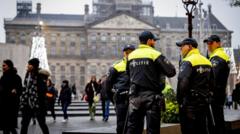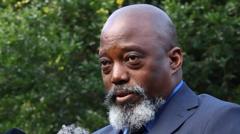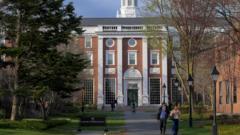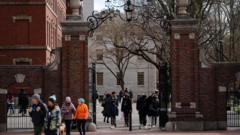In the wake of recent unrest involving clashes between Israeli football fans and local communities, Amsterdam grapples with heightened tensions. Officials and community leaders urge for mutual understanding to bridge the divides that threaten the city's cohesion.
Tensions Rise in Amsterdam: Community Leaders Call for Unity Amid Violence

Tensions Rise in Amsterdam: Community Leaders Call for Unity Amid Violence
Following violent clashes in Amsterdam, community leaders emphasize the need for dialogue and understanding to prevent further divisions.
Tensions have escalated in Amsterdam after recent violent incidents attributed to clashes involving Israeli football fans. Last week's unrest in the city has left many questioning the fragile state of relations among Amsterdam's diverse communities, particularly between Jewish and Muslim populations. City officials labeled the unrest a disturbing blend of antisemitism, hooligan culture, and broader sentiments stemming from the ongoing conflict in Gaza and the Middle East.
As Amsterdam clears the remnants of the chaos, including burned flags and vandalized property, community leaders highlight the risk of deepening rifts between various societal factions. Local Rabbi Lody van de Kamp underscored the precariousness of the situation, stating, "The buildup of tensions made this violence a long time coming." Furthermore, Emine Uğur, a prominent columnist in the Muslim community, voiced concerns over ignored anguish stemming from the conflict, which has left many feeling unheard and powerless.
The violence broke out amidst a Europa League match when Maccabi Tel Aviv fans traveled to the city, leading to confrontations with local groups. The aftermath found local authorities issuing a detailed report, outlining incidents of vandalism and violent clashes. Such events echo historical tragedies for the Jewish community, creating apprehension as these incidents closely coincided with the anniversary of Kristallnacht, a pogrom against Jews in 1938.
In response to the rising tensions, the Dutch government has pledged financial support directed at combating antisemitism. However, leaders within the Jewish community, such as Chanan Hertzberger of the Central Jewish Committee, stress that these efforts may be insufficient without addressing the rampant antisemitic discourse that has permeated society since the Israel-Hamas conflict reignited.
Politically, the unrest has exposed significant fractures in the ruling coalition, particularly in remarks made about the Moroccan community, which have sparked outrage and led to the resignation of junior minister Nora Achahbar. Discussions have evolved around the problematic nature of labeling immigrants as "other," despite their long-standing histories in the Netherlands.
Community leaders and academics are now calling for a focus on dialogue and mutual recognition of each other’s challenges, urging citizens to refrain from scapegoating based on the violent actions of a few. As tensions remain high, Amsterdam's diverse residents are faced with the critical task of healing and fostering coexistence in an age fraught with division. Rabbi van de Kamp poignantly remarked that despite the anger felt, there is an imperative to embody solidarity rather than enmity.




















